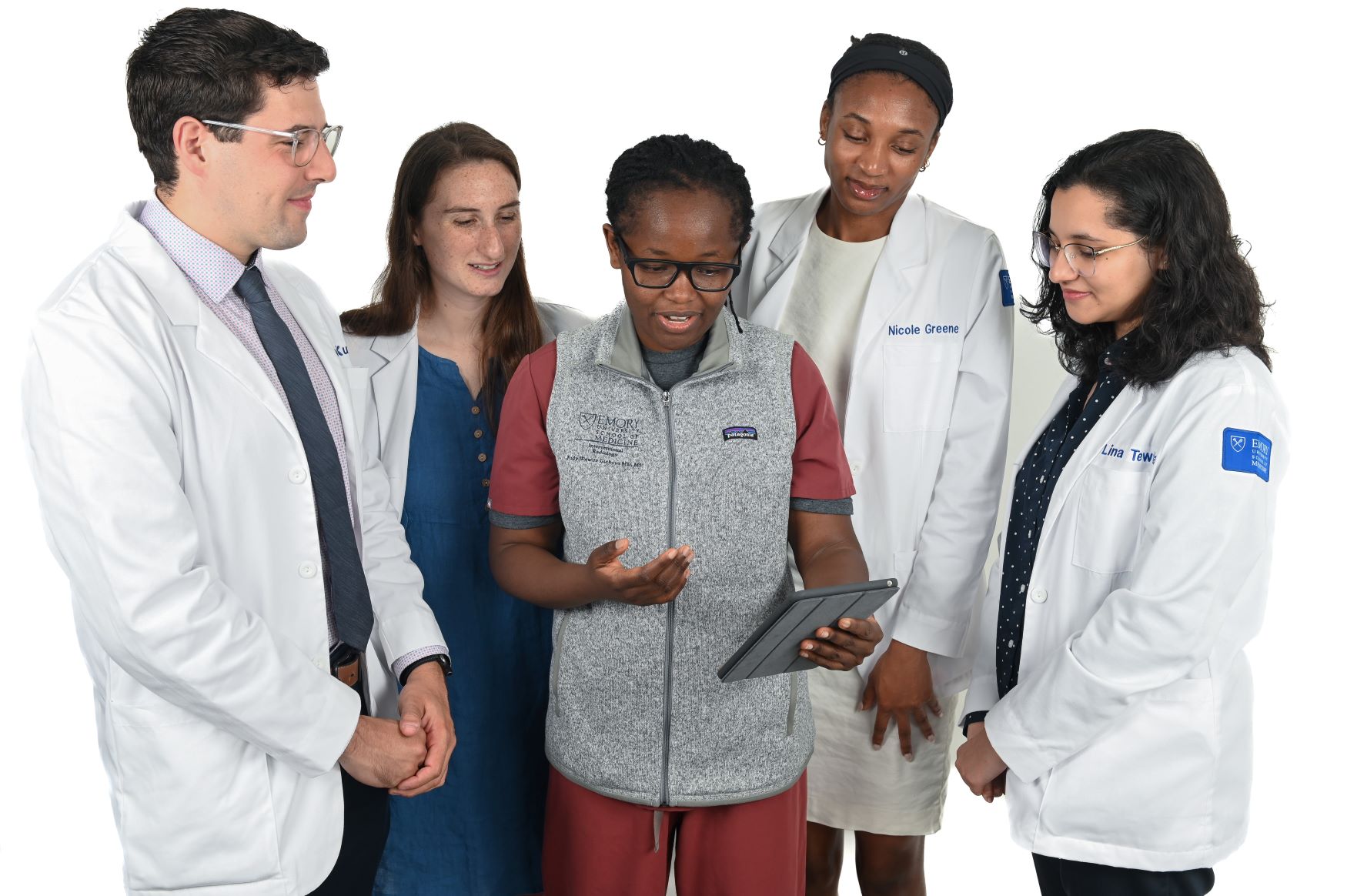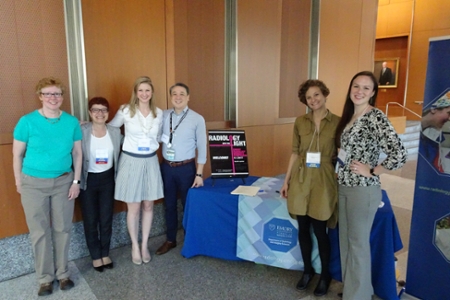We are proudly dedicated to and passionate about medical student education and are pleased to offer many opportunities for medical students to engage with and learn about radiology. We also have many award-winning educators and have presented nationally regarding our medical student education curriculum and methods.
- Mark E. Mullins, MD, PhD
Director of Radiology Medical Student Education
Emory Radiology faculty encourage medical students both formally and informally. For example, Emory School of Medicine students Daniel Kulp, Gabby Gershon, Nicole Green, and Lina Tewer work on AI data projects with Dr. Judy Gichoya, associate professor and director of the Healthcare Innovations and Translational Informatics (HITI) Lab.

Second-Year Medical Student Electives
Each year, the Department of Radiology offers at least one second-year medical student elective. Topics vary and previously offered electives include 1) Radiology Quality and Safety; 2) Drawing and Medical Illustration for Medical Students; and 3) Clinical Correlation: Anatomy, Pathology, and Radiology.
Emory Radiology Interest Group
Learn more about the affinity group specifically for medical students interested in specializing in radiology.
Third-Year Medical Student Required Clerkship
This two-credit-hour, letter grade “virtual” clerkship comprises radiology lectures, small group sessions, and shadowing, which are woven into the other seven traditional, required clerkships. Medical students have about 40 hours of contact with members of the Department of Radiology distributed over the entire third year, with topics appropriate to each particular clerkship rotation. For example, students on the surgery clerkship are shown how and what kinds of imaging can help diagnose the etiology of abdominal pain.
Students also learn how to approach common imaging studies such as chest radiographs and head CTs. In addition, they learn about the American College of Radiology Appropriateness Criteria® so that they know when imaging is indicated, and if so, what imaging modality is best for a given condition.
Students also learn 22 "don’t miss" imaging findings like pneumothorax and intracranial bleeding so that important diagnoses are not missed or delayed (Alliance of Medical Student Educators in Radiology). Finally, the students review 16 computer-based modules on important topics in imaging such as trauma and read the textbook Learning Radiology: Recognizing the Basics, 4th Edition. At the end of the third year, the students are tested using a nationally designed and validated computer-based exam offered by the Association of University Radiologists (AUR)/Alliance of Medical Student Educators in Radiology (AMSER) and Aquifer.
The clerkship director is Dr. Andres Su (email andres.wei-chiao.su@emory.edu) and Wanda Dozier (email wanda.dozier@emory.edu) is clerkship coordinator.
Fourth-Year Clinical Elective
The School of Medicine offers its medical students a Clinical Elective in Radiology, which is administered by Dr. Aine Kelly and Dr. Marie-Helene Gagnon. This elective provides a varied exposure to the Department of Radiology and Imaging Sciences and the numerous subspecialties (e.g., abdominal, cardiothoracic, interventional, neuroradiology, breast imaging, nuclear medicine and molecular imaging, musculoskeletal, and pediatric imaging) within our department. The duration of the elective is traditionally 4-weeks. Postgraduate students can discuss alternative timelines with the course directors on an individual basis.
This elective available to medical students combines didactic sessions with daily readouts. Core didactic sessions are tailored to medical students and cover general radiology topics students will find useful during the remainder of medical school and/or subsequent clinical practice. Learners also have the opportunity to attend radiology resident lectures.
A great deal of radiology teaching occurs at the workstation: attending radiologists conduct “readouts,” during which they review cases with radiology residents. This elective gives medical students the opportunity to participate in readouts either in person or virtually. Learners can select radiology subspecialties and clinical sites to best meet their interests.
In addition, students learn about the American College of Radiology Appropriateness Criteria® so that they know when imaging is indicated and what imaging modality is best for the situation. Learners also review a core set of pathologies, many of which are part of the 22 "don’t miss" imaging findings (Alliance of Medical Student Educators in Radiology) like pneumothorax and intracranial bleeding, so the learner can identify important diagnoses essential for avoiding a delay in care.
This elective uses a continual loop feedback process through brief weekly “check-ins” to optimize the learner's experiences.
Please contact Dr. Kelly at aine.marie.kelly@emory.edu or Dr. Gagnon at marie-helene.gagnon@emory.edu, or the course coordinator Wanda Dozier at wanda.dozier@emory.edu, if you have questions.


